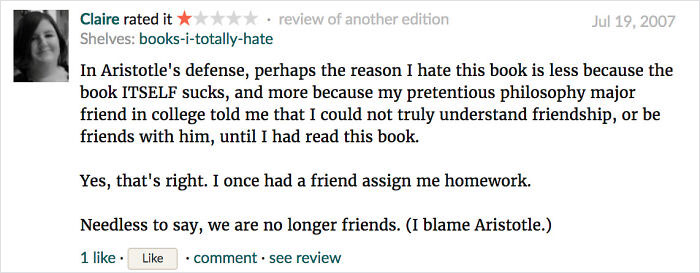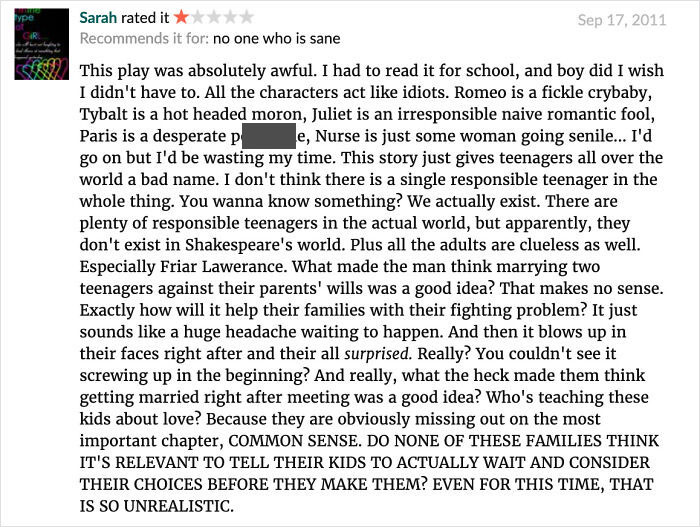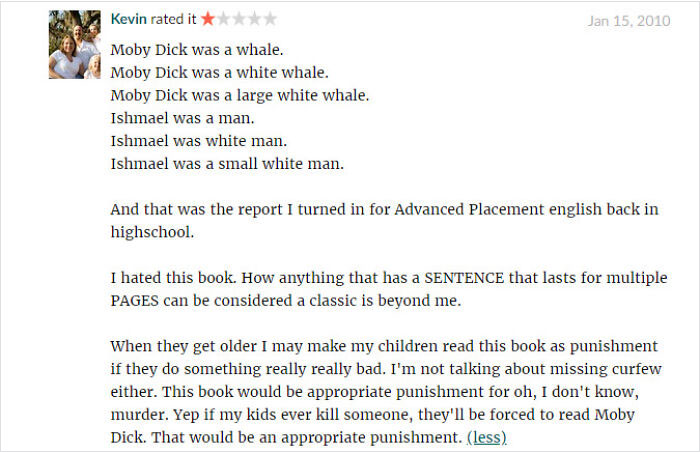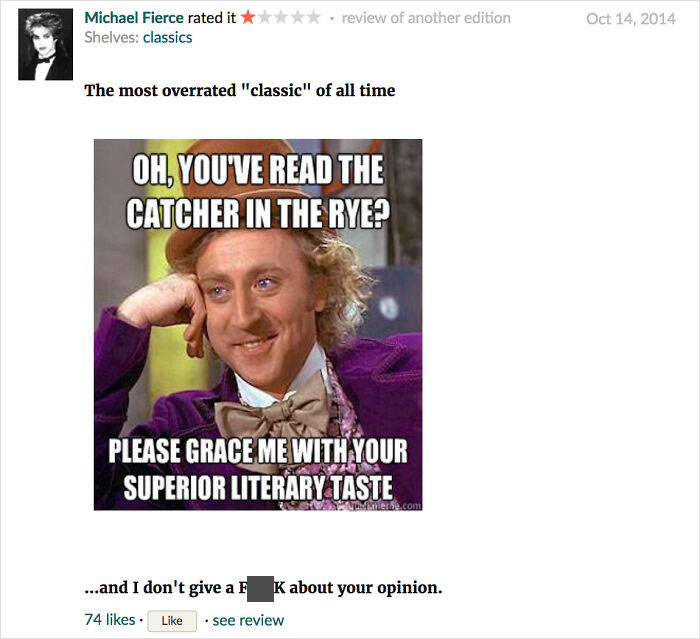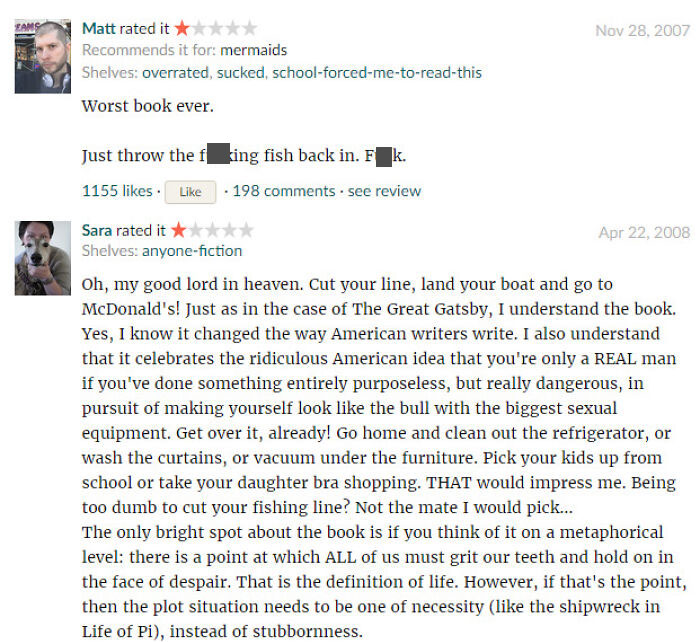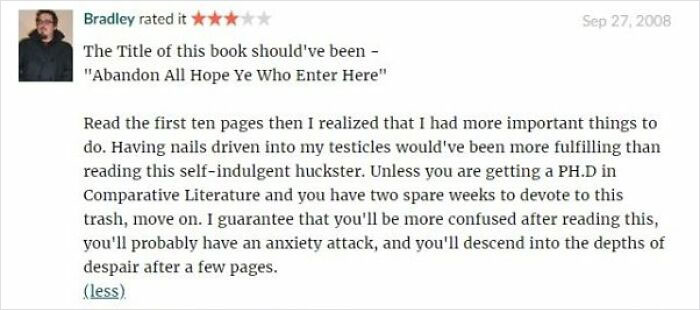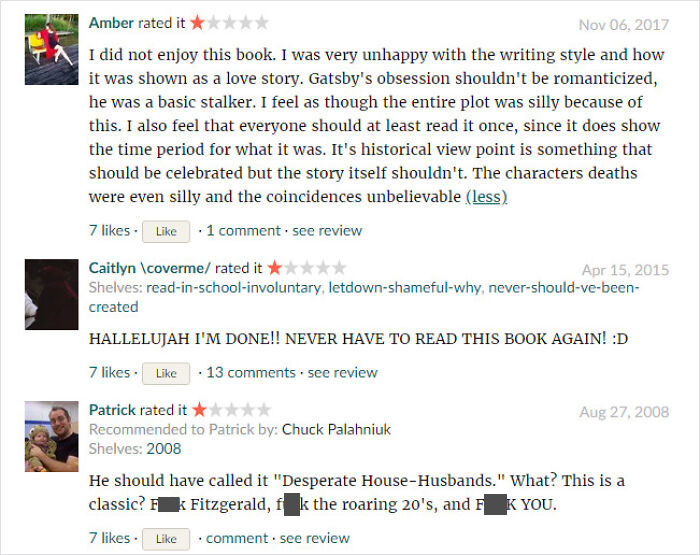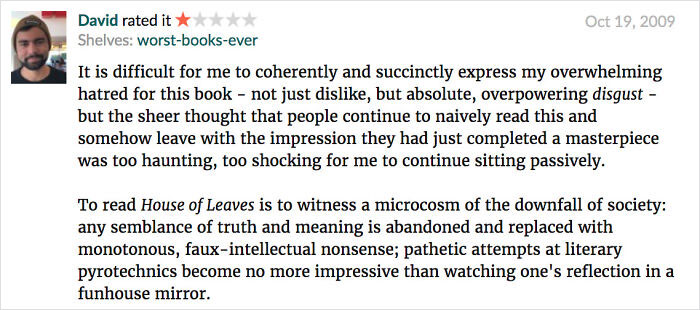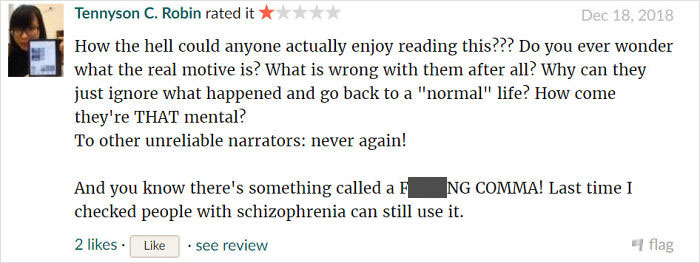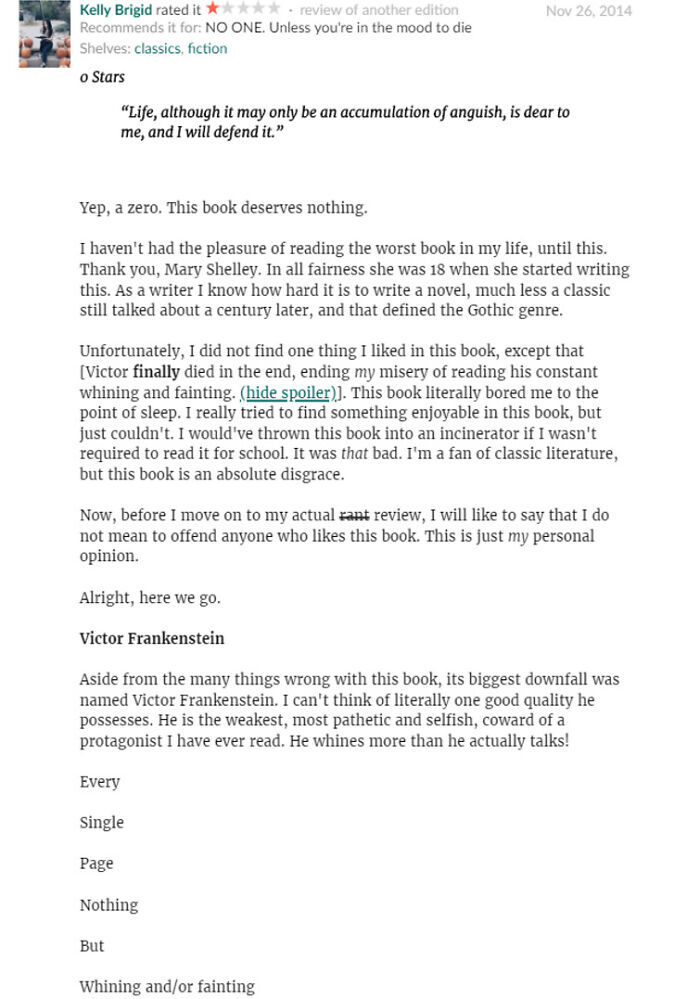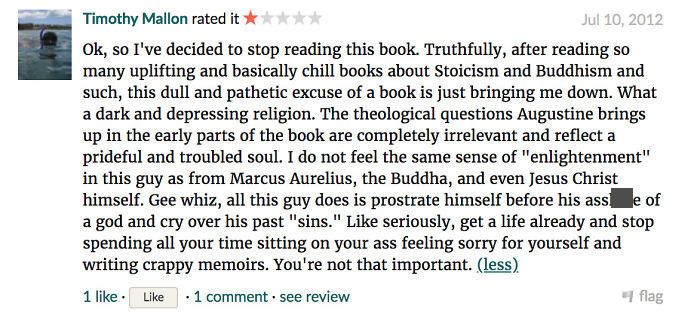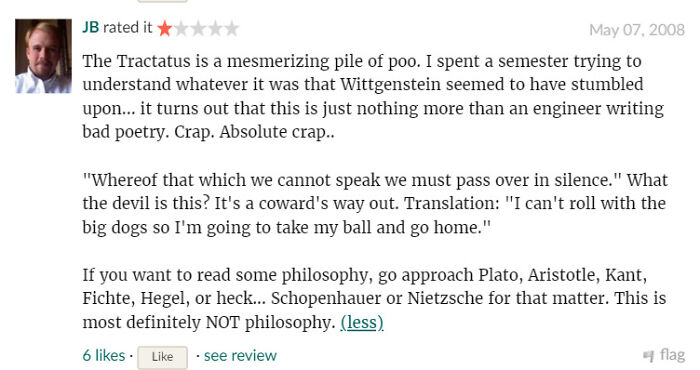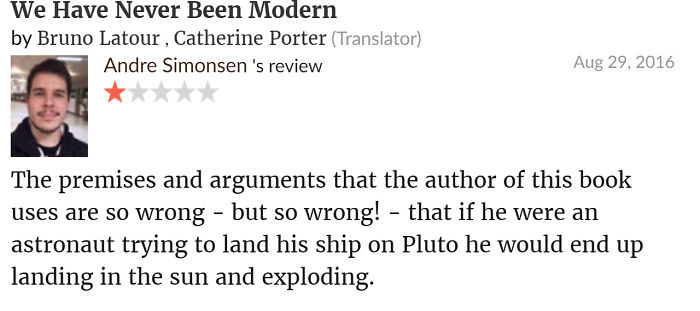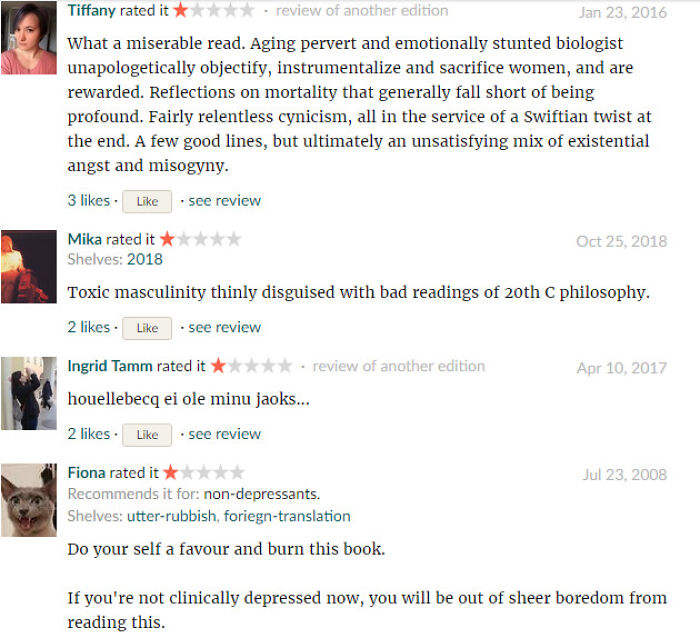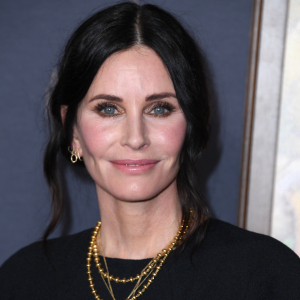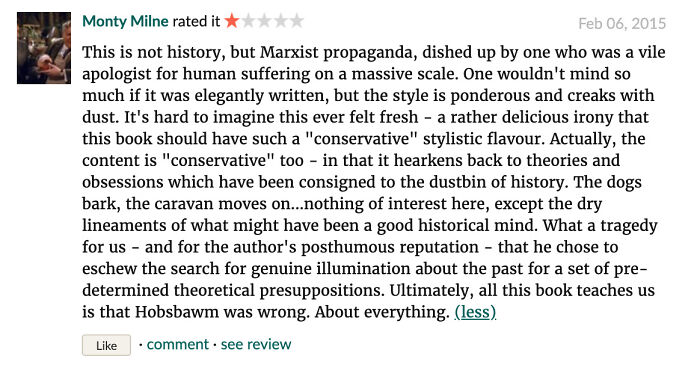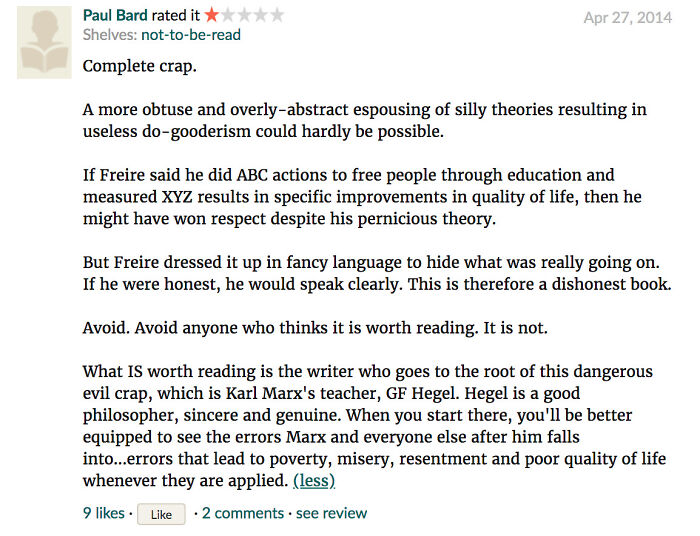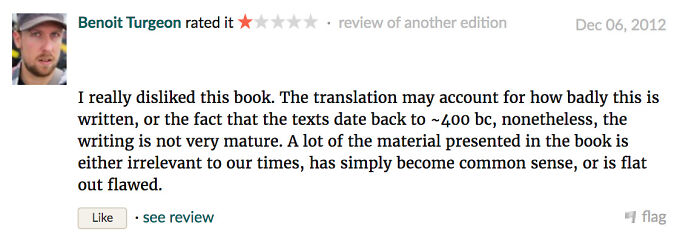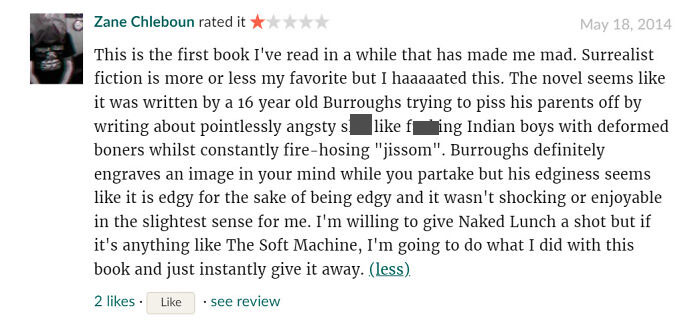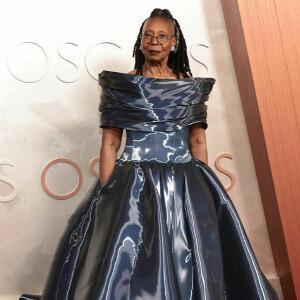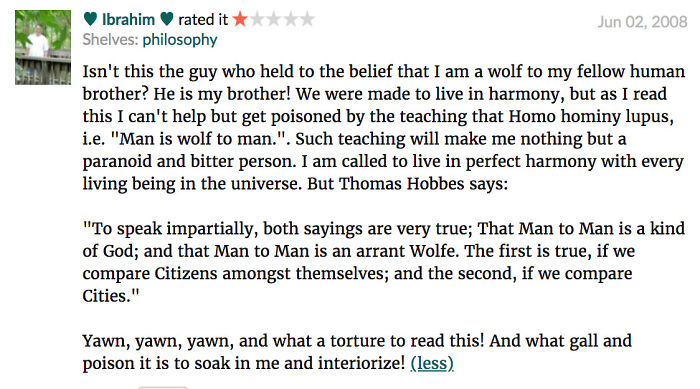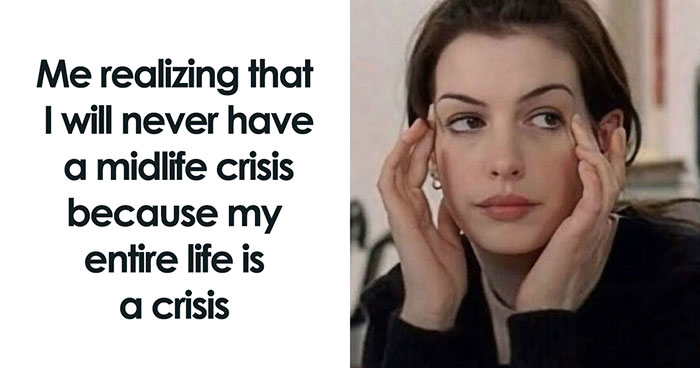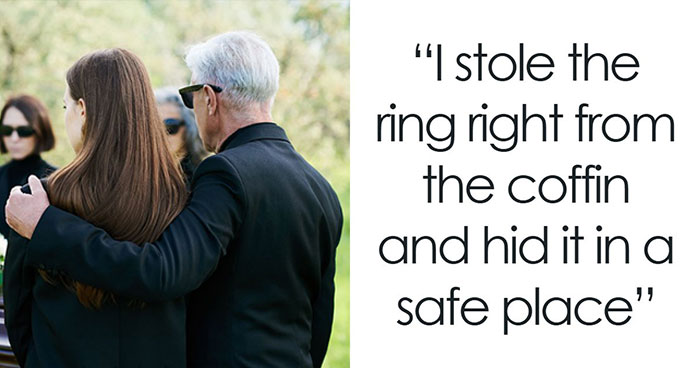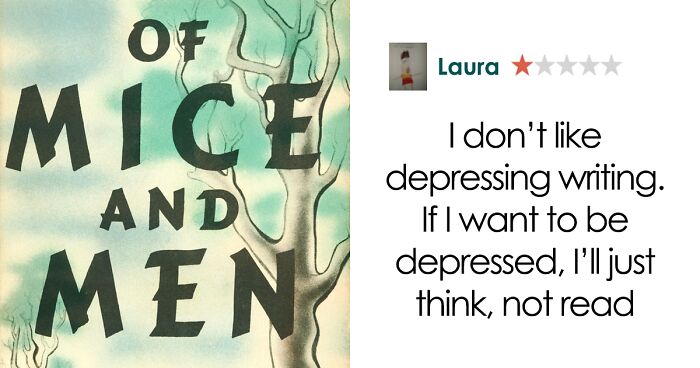
The ‘Haters Of Goodreads’ Online Page Collects Hilarious One-Star Reviews Of Books And Here’re 30 Of The Best Ones
When you, the reader, sit down to analyze a book, you must remember that whatever you choose to say is subjective. It's your opinion and you're entitled to it. Even if it means trashing a widely acknowledged author.
To give everyone the courage to speak their mind, the Facebook page Haters of Goodreads are sharing some of the funniest reviews that have appeared on the literary website.
Calling The Catcher in the Rye "the most overrated 'classic' of all time", refusing to finish Swann's Way due to Proust "discussing the smell of his chamber pot after having eaten asparagus"... It's all there!
This post may include affiliate links.
The Bible
Crime And Punishment
Of Mice And Men
As much as I love Mice and Men, this comment is hilarious. (Metallica in the background with 'Sad but true'. XD
If you, however, want to do (and write!) more critical analysis of the books you read, the University Writing Center at Texas A&M University suggests to begin by summarizing the basic plot — this will help ground you in the story.
Then, research the author's background and other work. This can give insight into their perspective and bias, as well as reveal what they might be commenting on. As an example, the University Writing Center mentions Tolkien's The Lord of the Rings. It's about a group of friends who embark on an epic journey and fight a great war. But knowing Tolkien fought in the Battle of Somme during World War I and that his closest friends were killed helps explain his sentiments about war.
Other questions about context can stem from the story itself: think about the narrator's personality and their role in the story. Also, it can be a good idea to consider who the narrator is addressing.
Aristotle, Nichomachean Ethics
Romeo And Juliet
Moby Dick
or...MD is nature, Ahab is human hubris, Ishmael is, well, a prophet...I think the problem are school curriculum deciding the age of students who read these classics.
Next, we have setting. When and where a story takes place can be of huge importance. Where the author's story is placed? Why the author made that decision?
Many stories would be irretrievably altered if their setting were different and setting is, therefore, vital for interpreting the story's meaning. To illustrate this point, the University Writing Center highlights the setting for Faulkner's work — the American South after the Civil War. It is essential to his overall message. Faulkner's characters are people who can't move on, and through them the author suggests that the South similarly can't get past the Civil War and the wrongs of slavery.
By the way, storylines usually evolve in patterns, so identifying essential plot points might help you to analyze, interpret, and explain the story as well.
Rousseau, The Social Contract
The Metamorphosis
Daniel C. Dennett, "Consciousness Explained"
But characters are the driving force behind stories, both the major and the minor ones. Like the above-mentioned Faulkner example suggests, authors can use them to broadcast their most important messages. You won't be able to analyze every character in a book, but pick out several important ones to consider.
For this, you can use the following questions: What are the character's main personality traits and why did the author give him these traits? What is the character's role in the story? What are the character's morals or ethics? Why does the author give him those? Why does the character do what he does? Why did the author make him act that way? What is the character's relationship to other characters and why?
Swann's Way
Proust saved my life. He gave me the will to enjoy small things in life. To be happy with small delights and pleasures. To notice little things, to live consciously. I love Proust
Nietzsche, Beyond Good And Evil
reading these makes me realise what doesn't kill me makes me stronger...
Plato, Phaedrus
Also, various literary devices help convey meaning or create a mood. Look for allusions, irony, symbolism, and other "tools" in a story to identify key points and their contribution to the author's overall message.
After you've worked on the story for so long, you should start to get a sense of its major themes, the big ideas that authors comment on throughout the work. Common themes are good vs. evil, human nature, religion, social structure, authority, coming-of-age, human rights, and so on. Books typically deal with multiple themes, some more obvious than others.
Once you complete the analysis, develop a thesis that makes an arguable claim about the text — like "wtf?" — and post it on Goodreads.
The Catcher In The Rye
A Brief History Of Time, By Stephen Hawking
As a non-physicist I actually enjoyed reading this book because Hawking managed to simplify the main theories and make them understandable. Of course if you don't care about time, space, quantum stuff and relativity theories, it must be a pain in the butt...
The Old Man And The Sea
Freud, Introductory Lectures On Psychoanalysis
Žižek, The Sublime Object Of Ideology
Hate Lvls 1, 2 & 3 The Great Gatsby
Ugh. I summarize this book, along with War and Peace, as 'Stupid people doing stupid things'
Danielewski, House Of Leaves
Foucault, Madness & Civilization
Dostoevsky, Notes From Underground
Herbert Marcuse, "One-Dimensional Man: Studies In The Ideology Of Advanced Industrial Society"
The Gay Science
Moby Dick
Kant, Groundwork Of The Metaphysics Of Morals
Its almost like the book was written 300 years ago and helped kick off an age of enlightenment that allowed us to discuss the very issues he has. Its like saying the Wright Brothers are overrated because their plane only flew 800 feet.
Murakami, 1q84
I understand the reviewer's sentiment. The book starts out like it's the real world, but when it shifts, it's not a lot, but still obvious. One wonders why the main characters don't think anything of it. I liked the book, though. I like stories that are less predictable than usual.
G.w.f. Hegel, "Elements Of The Philosophy Of Right"
Capital Vol. I
Me too, but since I am the last king and was unable to find the entrails of the last priest, here I remain.
The Death Of Tragedy (Hamlet)
one guy is left, the dude who is now king of 2 kingdoms due to everyone else being popped off.
The Cloud Of Unknowing
Pamela (By Samuel Richardson)
From back in the old days when the rich hot guy trying to rape the poor cute girl, which will then ruin her life and reputation, but "he just has to have her" was a HOT read.... you remember.....back in the old days....
Carl Jung, Man And His Symbols
"the meeting of two people is like a chemical reaction; both are transformed." [paraphrase]. I sometimes think that i carry a part of those people who were important in my life all the time. Not AT the same time, thankfully, but they're there.
Meditations On First Philosophy
Huh, I always found Descartes easy to follow... Granted, I am a "Word salad" kinda guy myself, soooo...
We Have Always Lived In The Castle, By Shirley Jackson
Ballard
On Liberty, By John Stuart Mill
Plato, Parmenides
Frankenstein
Nick Land
St. Augustine, Confessions
Very telling how the Pope just abolished the whole concept of ''Limbo'' (the place where good people go who haven't had the good fortune to actually become Christians because they were born B.C.), saying that St.Augustine ''just made that up'' and that it was never part of Catholic doctrine. Like heck. You should have heard my catechism teacher threaten me with hellfire and damnation when I said the whole idea is just garbage. Don't just dump ''Limbo'' but everything else Augustine wrote.
Why Are All The Gravity's Rainbow Negative Book Reviews Sooooo Weird
Kant, Critique Of Practical Reason
Hobbes, Leviathan
I Hate It When Books Have Words
Thomas Pynchon, The Crying Of Lot 49
The Tractatus
I agree - I seriously wonder whether Russell was just impressed with the dude's money
Society Of The Spectacle
Baudrillard's Simulacra & Simulation
Mother Night
Sartre, Being And Nothingness
Martin Heidegger, "Being And Time"
Heidegger was a menace. You can't read German philosophy after 1450 without knowing about the lives of the men themselves. THEN it all makes sense (i.e. that they were menaces)
We Have Never Been Modern
Emerson, Self-Reliance And Other Essays
Bertrand Russell, A History Of Western Philosophy
It's not meant to be - it's a (very personal) reaction to the BIG names in philosophy, and an abiding reason not to take academic philosophy seriously
Marx, Capital Vol. 2
But do go back to vol.1 and read all the statistics on tuberculosis. Fascinating, actually.
Review
Eric Hobsbawm, Age Of Revolutions
Paulo Freire, Pedagogy Of The Oppressed
Just the third most cited book in social sciences. "Silly theories" meaning free education and introducing critical thinking in education. Good thing Paul Bard is a genius who knows better. God forbid people should be educated, we wouldn't want them to think. It's do-gooderism.
Plato, Complete Works
"Irrelevant to our times".... quick everyone stop reading anything NOT written in the last decade or so - it's irrelevant to our times! (Crossref Gatsby, Shakespeare, that brilliant comment that To Kill A Mockingbird doesn't work becaus now we have DNA evidence...). That's it, I'm done reading this list.
Burroughs
Howard Zinn, A Peoples History Of The United States
When my kid was in 6th grade, he read "Young People's History of the United States", a annotated, illustrated version aimed at his age group. I appreciated that version because that is the right age to start teaching to think critically instead of just accepting facts about the shiny side of history. Its ok to question authority and look behind the curtain to see things like slavery and corruption so we can avoid past errors.
Back With Some More Hobbes
A Deep Look Inside The Decaying Mind Of An Anti-Communist (What Is To Be Done?)
Man's Search For Meaning
Why would you want to watch Jordan Peterson, that pseudo intellectual full of bull.
To Kill A Mockingbird
Presumably Oliver Twist doesn't work as a condemnation of society because we now have social workers.
I was looking forward to intelligent, counter-mainstream opinions, perhaps even occasionally pointing out when the emperor has no clothes. Most of these made the commenters seem shallow, uneducated and anti-intellectual. CORRECTION: After the first dozen or so, they improved considerably. Either that or the first dozen killed off my remaining brain cells.
You have no clothes then, my dude (edited after seeing your edit: perhaps mine eyes have endarted upon false presumption)
Load More Replies...Seems like a list of emotionally immature people forced to read books they're not interested in for school, and doing as little as possible to try to understand what they're reading.
Rehabilitating the name of Amy Fisher, are you? (Then again, I would hope you DON'T like a certain Russian novelist.)
Load More Replies...I was looking forward to intelligent, counter-mainstream opinions, perhaps even occasionally pointing out when the emperor has no clothes. Most of these made the commenters seem shallow, uneducated and anti-intellectual. CORRECTION: After the first dozen or so, they improved considerably. Either that or the first dozen killed off my remaining brain cells.
You have no clothes then, my dude (edited after seeing your edit: perhaps mine eyes have endarted upon false presumption)
Load More Replies...Seems like a list of emotionally immature people forced to read books they're not interested in for school, and doing as little as possible to try to understand what they're reading.
Rehabilitating the name of Amy Fisher, are you? (Then again, I would hope you DON'T like a certain Russian novelist.)
Load More Replies...
 Dark Mode
Dark Mode 

 No fees, cancel anytime
No fees, cancel anytime 






